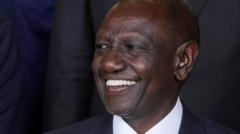**Kenya's President William Ruto is no stranger to nicknames, embodying both endearments and criticisms that reflect his ever-evolving public image.**
**Kenya's President William Ruto: A Leader Defined by Nicknames**

**Kenya's President William Ruto: A Leader Defined by Nicknames**
**As William Ruto faces a tide of public sentiment, his multitude of nicknames highlights the complex relationship he shares with Kenyans.**
Kenya's President William Ruto is a man synonymous with a host of colorful nicknames that capture his complex relationship with the populace. Titles like Deputy Jesus, El Chapo, Hustler, and Chicken Seller encapsulate how perceptions of him have shifted over time, often mirroring the sentiments of those he leads.
Ruto himself has embraced these appellations, playfully remarking on the whirlwind of names thrown his way. At a recent rally, he quipped, “You have given me so many names... Will you stop at ten, or should I prepare for more?” The jovial atmosphere underscored how these monikers reflect people's mixed perceptions of his leadership, from admiration to ridicule.
Before ascending to the presidency in 2022, Ruto garnered names that painted him as a champion for the underprivileged. The Hustler title resonated with many Kenyans striving against adversity, while Chicken Seller harked back to his modest beginnings selling poultry. However, these positive aliases gradually gave way to sharp scrutiny, particularly following the implementation of controversial tax measures that have led many to feel deceived.
Political analyst Prof. Herman Manyora emphasizes that many of Ruto's historical nicknames bolstered his image and helped him secure votes. Yet, as president, he has become embroiled in controversies that have birthed a new wave of nicknames—a reflection of growing discontent across the nation.
New titles such as Zakayo—symbolizing greed—took root as Kenyans perceived Ruto's government as betraying the very populace he claimed to represent. His association with tax hikes has led to protests and outbursts of disapproval, culminating in the rallying cry “Ruto must go,” showcasing a public weary of unmet promises.
Moreover, humorous comparisons have emerged, such as Vasco da Ganya, which denounces alleged dishonesty about his travels, and Kaunda Uongoman, critiquing his integrity while reflecting local cultural references. The political atmosphere surrounding him has made these nicknames not only a form of comment but also a means of catharsis, particularly among the youth who feel marginalized by the current economic landscape.
Despite the mockery, government officials argue that the nickname phenomenon is simply a reflection of public sentiment and not an issue of concern for the presidency. Supporters, including university students, acknowledge that while Ruto's leadership may not always align with their hopes, his attitude toward these nicknames indicates resilience and strength.
Young Kenyans, facing various socioeconomic challenges, utilize these monikers as tools of expression and an avenue to voice their frustrations over their circumstances. The sheer volume of names attributed to Ruto demonstrates the intricacy of accountability and relationship dynamics between government and citizens in the digital age.
While past Kenyan presidents bore nicknames, none have faced such extensive public scrutiny through monikers, indicating a unique junction of politics and social commentary in today’s Kenya. The age of social media undoubtedly fuels this trend, amplifying voices that weave together humor and indignation as they navigate pressing issues of governance.



















